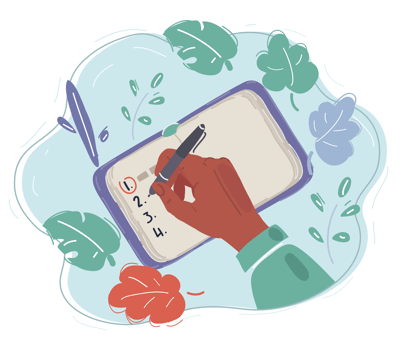 The New Year is almost here! Have you made your New Year’s resolutions yet?
The New Year is almost here! Have you made your New Year’s resolutions yet?
Since we’re as committed to helping you reach your Portuguese language-learning goals as you are, we’ve put together some ideas to help you use our platform as effectively as possible.
At the end of the article we’ve also included a worksheet to guide you through creating a personalized study plan.
Learning a new language comes with so many rewards. It’s the key to experiencing the world in a new way and making deeper connections with the people you meet. But with so many different methods, strategies, tips, and advice, it’s easy to get overwhelmed when trying to figure out the best way to learn Portuguese. There’s no one-size-fits-all approach. We all have different goals and learning styles, so where do you start?
It all comes down to 3 main concepts:
RelevânciaRelevance
ResiliênciaResilience
RepetiçãoRepetition
Relevance

Think about the last time you met someone new. At the end of the conversation, you probably remembered the funny story they told you. You remembered that you have a mutual friend. You remembered that they complimented your shoes. But, be honest – did you remember their name?
The things that stick in your memory are the things that are most meaningful. We can’t remember everything, so our brains naturally hold onto whatever is most closely linked to our emotions, goals, and interests.
Think about why you want to learn Portuguese. Go ahead: Make a list, and get specific!
Do you want to spend more time with your Portuguese grandfather? Do you want to order dinner without embarrassing yourself? Do you want to impress your Portuguese mother-in-law? Do you want to communicate with a realtor about moving to Portugal? Do you want to make a hotel reservation? Or do you just want to be able to make small talk with your Portuguese neighbour?
List out all the little reasons and big reasons that learning Portuguese will impact your life, and allow yourself to feel the emotional energy behind those reasons to make them more powerful.
How to make learning Portuguese more relevant:
Choose your own path
If you’re already a member, take a few minutes to browse through all of our Lesson Units. Since we don’t force you to go through them sequentially, you can skip around to find those that best fit your your goals and interests. (Are there any that are worth revisiting again?)
(Psst… we’re also adding a ton of new units in January, so check back soon!)
Hear realistic conversations
Think about what kind of conversations you hope to have. Do you want to ask someone out on a date? Do you want to order a coffee? Do you need to talk with government agencies about residency or citizenship? Do you want to talk about history?
Browse our Shorties to find the topics that matter most to you and listen to realistic dialogues (and interesting articles) as you follow along with the transcript. Pay attention to the Tags. If you find a particular Shorty you like, you can click on the Tags to view other Shorties of similar topics.
Find relevant verbs and vocabulary
Are there particular verbs or vocabulary terms that are related to your goals? If you’re not sure, the Verbs section of the site will get you started with practicing the conjugations of the most commonly used verbs, which are listed first. (The Shorties also each have a vocabulary and expressions section for you to review.)
Do the lessons with a focus in mind
Okay, sometimes it’s hard to see how learning clitic pronouns is going to change your life.
Grammar can get boring, but we’ve made it more relevant by taking notes for you! We’ve distilled the most useful information from each of our Units into short articles (Learning Notes) that have tons of examples (with audio)!
These also appear throughout the lessons to help you focus on what’s most important.
And it’s not just grammar. There are plenty of notes on fun topics (like Portuguese Slang (Gíria), functional topics (like Applying for a NIF), and topics that you can use in your daily life (like Storage, Tools, and Cooking).
Have fun with it
Watching videos is a great way to connect with the language and laugh a little, while picking up Portuguese in a natural context. Here are two of our favourites to get you started:
- O Joel Quer Pipocas (Joel Wants Popcorn!) (animated)
- Lavar Loiça com Avó Odete (Washing Dishes with Avó Odete) (live)
Journaling
Having trouble knowing where to start? Try keeping a journal in Portuguese. It can just be a few sentences (or brief notes) about what you did that day and what you plan to do tomorrow. This is a great way to apply what you’re learning and will also keep you aware of what words, phrases, and topics are most relevant to your everyday life. That way, you’re primed to pay attention to those things as you work through the lessons.
Don’t worry about making mistakes. Even if everything you write is grammatically incorrect, (that’s unlikely!), this exercise will help you retain what you have already learned. Your mind will also naturally come up with new questions based on what you don’t already know how to say. When you do come across those new skills in your studies, you’ll be much more likely to retain them, because you’ve already made them relevant to yourself.
Resilience

We want to remind you that it’s okay to fail. In fact, it’s necessary! If you aren’t struggling and making mistakes, then you probably aren’t learning much, or challenging yourself enough. What really matters is that you focus on maintaining resilience in the face of these inevitable setbacks.
Mindset by Carol Dweck is an excellent book for that explores the idea of a growth mindset vs. a fixed mindset. If you can maintain a growth mindset, then you’ll avoid getting frustrated when faced with a challenge. Someone with a fixed mindset would be frustrated by what they don’t know, because they’ll feel like they’re inherently bad at languages.
On the other hand, someone with a growth-based mindset is humble, resilient and up for the challenge to learn a new skill, even when it’s difficult.
How to stay motivated and resilient:
Dealing with slumps
It’s normal to hit a point from time to time when you start to feel unmotivated. What sounds energizing on January 1st is suddenly quite tiring on January 31st. Try creating a plan for when you hit these roadblocks.
Here are some tips to help jumpstart your language-learning again:
- Remember that list you made earlier of why you wanted to learn Portuguese? Use it to set mini-goals for yourself by breaking your longer-term goals into smaller, more manageable tasks that you can accomplish in a day or a week. It could be as simple as “ask for the menu in Portuguese at lunch today” or “memorize the numbers 1-20 in Portuguese”. A great way to get back on track is to spend some time clearly identifying baby steps toward the goals that matter to you.
- Spend some time in our European Portuguese forum. This is a great place to ask questions and connect with your fellow Portuguese learners in a supportive environment, (and you’ll get answers to your vocabulary and grammar questions too!)
- Try a different study method. Have you been focusing on mostly listening activities, like Shorties and Podcasts? Try switching to the Units where it’s more interactive and sequential: you can focus on reading, typing responses, and speaking practice. Are you stuck on a particular Unit? Try switching to the Verbs section instead for a few days.
- Make it enjoyable. Take a break from grammar rules and verb conjugations to watch our documentary film Passo a Passo. You can enjoy the beautiful scenery of Portugal as you listen to real interactions in Portuguese. Don’t worry about understanding every word – the subtitles are there when you get stuck. (For a less self-serving suggestion… check out a Pixar movie or two, since you can usually find really well-dubbed European Portuguese versions, at least in Europe).
- Add a little creativity. Write your own dialogue or short story. You can use words and phrases from a Unit or Shorty as ideas to get you started.
- Try studying at a different time of day or somewhere new, like a library or café.
Check in with your progress
Have you noticed the green circle at the top of each Unit? These percentages help you keep track of your progress throughout the lessons. Every few months, check and see how many more units you’ve completed. Then, think of a challenge you can give yourself to see how far you’ve come. For example, you could:
- Write a journal entry
- Have a conversation with a Portuguese friend
- Watch the same Video or listen to the same Shorty (without the transcript), and see how much of it you can still understand.
Whenever you do a writing exercise, take note of the extra details in your writing, the new phrases you were able to say or understand, or the new vocabulary you’ve picked up. Learning a language takes time, so it’s easy to lose sight of these small improvements without making an effort to compare your progress.
Using all 5 senses when learning
Sometimes getting back on track is about engaging more with the learning process. An easy way to do that is to find ways to use each of your senses. Here are some ideas for each one:
- See (Read): Read Learning Notes, read books in Portuguese
- Hear: Listen to a Shorty, listen to a Podcast, watch a Video, listen to Portuguese music
- Touch (Write): Type Portuguese as you complete the Units, handwrite a Shorty as you listen to it, handwrite all the phrases you learned from a lesson, send text messages in Portuguese
- Speak: Do some Speaking Practice within the Units, have a real-life conversation, have a phone conversation… maybe you can tell someone a summary (in Portuguese) of the Shorty or Podcast episode you just listened to
- Taste: Uh… Let’s just use this as an excuse to take a break and drink some Portuguese wine, (or pastel de nata)!
Take care of yourself!
It’s hard to learn when you’re too tired or distracted to focus. It doesn’t matter how much willpower you manage to pull together if your mind and body aren’t in their optimal state. Exercising, eating well, and getting enough sleep will put you in the right mindset to continue learning even when it gets tough.
Repetition
 So you’re making learning relevant… You’re staying resilient… Now what?
So you’re making learning relevant… You’re staying resilient… Now what?
We wish there was a shortcut, but to get results, it comes down to putting enough study time in and getting enough repeated exposure to the language.
How to get enough repeated Portuguese practice:
Set up a routine
The key to getting enough repetition is to find a way to be consistent with your learning. Consistency doesn’t always mean doing the same exact thing over and over. It means finding a way to fit learning Portuguese into your life on a regular basis.
Learning a language is a gradual process, so think about what will be the most sustainable routine rather than the most impressive.
What kind of study schedule really works for you? If you push yourself too hard (“I’m going to study for 8 hours every single day!”), you’ll burn out quickly. If you make it too easy (“I’ll just study when I have time”), you probably won’t get enough repetition in to make things stick.
What time of day do you learn best? Can you fit in shorter, more frequent study sessions? Or would longer, more spread out study sessions be better?
Habit stacking
It can be hard to start a new habit, so why not build off of an existing one? Think of all the things that you already do regularly without really trying. Do you drive to work every morning? Do you do the laundry every Friday? Do you make a cup of coffee after lunch? Do you buy groceries often? Whatever it may be, find a way to link Portuguese study time to that habit. For example, you could:
- Listen to a Podcast episode in the car on the way to work.
- Work through a few lessons until the washing machine buzzes.
- Listen to a Shorty as your coffee is brewing.
- Name food items in Portuguese as you add them to your grocery basket.
Working Portuguese practice into your daily life like this is an easy way to get extra repetition (and make it more relevant!) without having to commit to an intense study schedule or rely on others.
Review regularly
Make use of Smart Review! This new tool keeps track of all the phrases you’ve been learning throughout the Units and creates personalized review sessions for you. It uses spaced repetition to help your brain move information from short-term memory into long-term memory more efficiently.
If you see the Smart Review button appear on the Units page, that tells you that you have phrases ready to review. It’s good to stay on top of this so that what you learn isn’t just going in one ear and out the other. It might feel good to power through 10 units, but by the time you get to the last one, you will probably have forgotten everything from the first one! Adding these reviews into your study helps make what you’re learning stick.
Pronunciation practice and listening skills
Part of speaking like a native is forming muscle memories. As you repeat a word or series of sounds over and over, your brain forms stronger and stronger connections between the actions your tongue, teeth, and lips need to make to produce the sounds. Just like riding a bike, eventually it starts to feel natural.
Take advantage of the speaking practice questions throughout the Units by repeating the phrase until you get close to 100% accuracy. You can even add some extra repetition by repeating phrases aloud to yourself after the other question types, too. And just like speaking, listening to the sounds of the language over and over helps to train your ear. Remember that you can click the turtle button to hear a word or phrase pronounced slowly and clearly.
Create your own Portuguese study plan!

We hope these ideas have helped you think about working relevance, resilience, and repetition into your learning goals. Now we want to invite you to start the next decade by forming a plan that works for you.
It’s time to get started! Download the worksheet below and use what you learned in the article to complete your study plan. Keep the worksheet with you throughout the year to guide you along your language-learning journey!
UPDATE May 2020: This Study Plan was created before we launched the new Smart Review tool, so the “Units to review next” part can be simply replaced with “Do Smart Review!” 😉🧠 We still recommend reflecting on your habits and progress using the rest of the worksheet.
Practice Portuguese Study Plan (PDF)
Feliz Ano NovoHappy New Year e Boa SorteGood luck !




Obrigada! A great read to get myself back on track after 6 weeks in America!
Thank you for your recent notes and advice for study in 2020
I have recently been using the Shorties as a Dictation exercise as suggested in your tips
It is quite difficult to time the pausing of the dialogue to catch up with writing a sentence/phrase
It may be technically difficult for you to add but it would be useful to have an option to play the dialogue in a “dictation mode” –
that is to say with time gaps between sentences to allow writing catch-up
thanks and regards
Robert
I like this idea Robert. I think it could be really useful.
Great advice for your followers. We use all those ideas in our group where the Listen – Speak – Read – Write activities are in use at every session. Everyone writes a paragraph each week to read out loud which is then discussed by the group, we also read short stories (out loud), translate them and talk about them before stopping for um café e uma bolacha. The repetition method is used in our verb learning method (old-fashioned by rote0 and all our students know five tenses of all the regular and most common irregular verbs within the first six months of starting to learn the language.
Obrigado! Let me give this a try….my wife and I just want to learn some Portuguese for our next trip!
Este vai ser muito util.
Muito boas ideias. Vou tentar fazer algum de estas. Obrigado.
Thank you so much for this, a lot of valuable advice & suggestions!
I can definitively relate to finding things that make learning fun and keep one motivated… I would also add that taking regular breaks is often necessary. A bit like recovery days when going through an exercise regime. There are times when I get up and my mind is like ‘ok i don’t want any more (new) info to digest today’ and so I leave it and i find that that following day I am more receptive and it is generally more enjoyable and productive than when I make myself go through the daily goals…
Thank you for your message, Giusi! You’re right, sometimes, a little pause can do wonders for your mood and focus 🙂
I wish you had a bank of the new words(actually mainly nouns) learnt in the lessons ,
Thanks for the great lessons